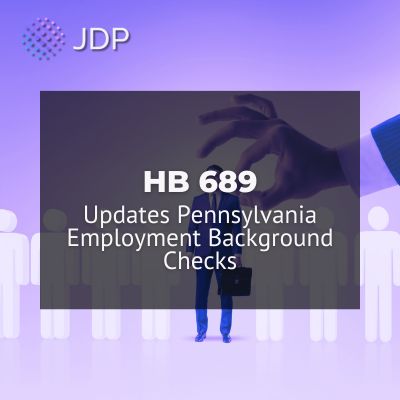Feb 23, 2024
Employers in Pennsylvania recently saw significant changes to the criminal background screening process through House Bill 689 (HB 689). However, these changes will primarily affect those in Philadelphia. These updates will expand the limitations when using certain criminal records. It also includes more protections for employers when applicants voluntarily disclose information.
Pennsylvania enacted HB 689 on December 14, 2023, and it became effective on February 12, 2024. HB 689 aims to clarify any ambiguity related to potential allegations of negligent hiring about individuals who share information on expunged criminal records. This new law grants employers immunity from liability for any claims arising from the lawful use of criminal record information.
It also protects employers from the effects of expunged records if an applicant voluntarily discloses the conviction. Before HB 689 took effect, employers could face negligent hiring lawsuits if they discovered expunged criminal records outside of a formal background check or court record. This amendment would prevent plaintiffs from accusing employers of negligence for hiring individuals despite having disqualifying records.
Philadelphia has also recently changed its Fair Criminal Record Screening Standards Ordinance. This ordinance took effect on January 19, 2024. The amendment addresses the use of “exonerated” convictions. Its definition includes reversed and pardoned convictions due to dismissal, acquittal, pardon, or other means of post-conviction re-examination by a court or official. In most cases, the amendment also bars employers from denying employment based on these convictions.
HB 689 also expands access to automated expungements to include pardoned cases. Under this law, the Pennsylvania Board of Pardons will provide quarterly reports of any granted pardons to the Administrative Office of Pennsylvania Courts (AOPC). The AOPC would review these reports before directing the appropriate Court of Common Pleas to expunge the associated records.
Expunging these records would prevent private entities from accessing them when making decisions for affected individuals. Such decisions include an individual’s employment, housing, or educational pursuits. HB 689 also provides exceptions to the restriction, such as federal law requiring access. However, how quickly the automatic expungement process will remove records from public view remains uncertain. Many have questioned whether individuals will receive notifications and if court dockets will show when records undergo expungement.
Finally, HB 689 will expand eligibility for individuals to apply for “limited access status” for criminal records. This status will prevent access to associated criminal records for most purposes, such as background checks for employment or housing. This expansion also allows individuals who remain free from conviction for seven years and meet specific requirements to submit a petition for limited access.
Disclaimer:
Information provided here is for educational and informational purposes only and should not constitute as legal advice. We recommend you contact your own legal counsel for any questions regarding your specific practices and compliance with applicable laws.
